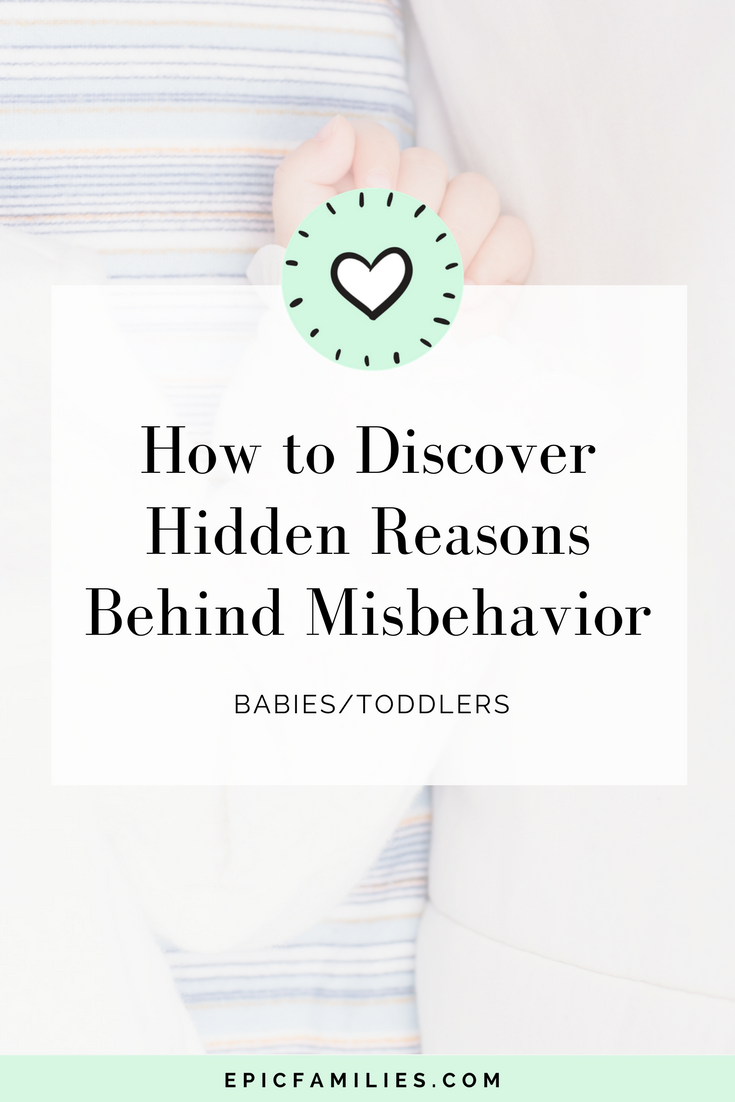PART ONE: BABIES/TODDLERS
I spoke with a mom last week who was concerned about her daughter’s attitude. She was having difficulty dealing with it. I think her concerns are fairly common.
As moms, we don’t want to yell at our kids; we want to parent peacefully and have kids who listen and behave the first time-without us having to yell, bribe, or punish. In a perfect world, that’s what would happen-every time. But, we all know that we don’t live in a perfect world; we’re not perfect, and our kids aren’t perfect. Trust, however, that you are the perfect mom for YOUR kids. Period. And by putting on your Sherlock Holmes cap for a few minutes, you can discover hidden and often overlooked reasons behind misbehavior. Once you identify these common reasons for acting out, then you’re in a much better position to relate to your child in a way that makes them want to obey the first time. And as a bonus, you’ll discover how parenting with empathy sets up a strong relationship between you and your child, so that when greater challenges come along, your equipped to confidently deal with them.
Remember, as parents, we need to get under the hood and see beyond the bad behavior to the reasons behind it. Sometimes the issues are serious, but other times, misbehavior is caused by some surprisingly simple, but often overlooked, issues.
Common Reasons for Fussiness and Misbehavior: Babies-Toddlers
Colic (babies) – it seems like most babies go through a phase where at a certain time of day, they just melt-down, and nothing we do can calm them. It might be food related (see below) or they may just have a tummy ache from taking in too much air. Here’s what I found worked for almost all of mine: background noise. I started with the vacuum cleaner (yes, it was loud, but it worked like a charm. Sometimes, I would put baby in a sling and actually vacuum the floor. ;o) That was a win-win!). I discovered that the bathroom fan worked just as well most of the time, and was much more tolerable. Noise machines and vibrating infant seats work well also. This portable soother by Summer that can be hooked onto any car seat, stroller, or baby seat is definitely a life saver and so much better than the vacuum cleaner!
Food sensitivity – If your baby is formula fed, this is not uncommon, and you may need to switch formulas. If you’re nursing, there may be something you’re eating that is upsetting their tummy. With mine, dairy products that I was eating turned out to be bothering them. Wheat is also another very common one. Our doctor told me that sometimes when the mom doesn’t completely digest a protein (hence dairy/wheat are common) that molecules of that protein pass through your breast milk and irritate your baby’s tummy.
Hunger/thirst – With babies, this can be more obvious than with toddlers, but you can’t always depend on a schedule, especially if you are breastfeeding. If your baby seems hungry even though h only ate an hour or two ago, he truly may be hungry again. With toddlers, it’s a bit less obvious. Toddlers can have so much fun that they forget to eat. My son would do this all the time when he was two-three, and then suddenly the hangry monster would appear in full force!! Thirst can have a similar effect. So, if your toddler is acting up, they may be thirsty or hungry and just not be able to articulate that need to you.
Teething – This is another one that tends to be a bit more obvious with babies, simply because we are expecting them to teeth. Not every child will get teeth at the average age. Some will teethe earlier; others later. Remember, though, that two year olds (or in the case of mine, 18 month olds) get molars, and they can be exceedingly painful coming in and lead to a serious case of crankiness! Personally, I don’t use tylenol, although many do. I prefer to use a topical anesthetic, icy facecloth to chew on, or essential oil on the gums.
Growth spurts – Ever be puzzled about why your baby or toddler isn’t sleeping or is cranky only to discover a few days later that they seem to have grown a size or two “overnight”? My grandmother used to talk about growing pains, and there is probably merit to that concept. At the very least, I think, growth spurts or a new developmental milestone leads to restlessness and, often, crankiness.
Illness – Kids frequently show crankiness first, fever or other symptoms later. It’s good to be aware beforehand that crankiness can be the first symptom of the crud.
Overstimulation -When kids are overstimulated or put in a situation that requires self-control for longer than they are capable of, look out! As parents, we can save ourselves a lot of aggravation by recognizing these situations and, when possible, avoiding them or getting out of Dodge as asap!
Boredom – On the opposite end of the spectrum, boredom can activate a need for stimulation, even if it’s negative attention that they’re getting. I think a lot of the time, this happens when we’re busy and don’t connect with our kids as often as we should during a given time. I can so totally relate to this one. When one of mine was little, we moved two or three times, and I used the TV and videos to babysit her while I was packing. A better solution may have been to have here there with me, “packing” things she was capable of, even though that may have caused me to be less efficient. Most of the time, our babies and toddlers just want to be with us. By tweaking our routines a bit, we can ensure that our babies and toddlers avoid boredom while we still accomplish what we need to do.
A new routine – Babies and kids are creatures of habit. Any time we change a routine drastically or the dreaded fall back/spring ahead time change occurs, we all pay the price. Anything that substantially changes our kids’ routine can lead to insecurity, which can lead to fussiness. On the flip side, trying to enforce a routine (like a nap) when they’ve outgrown the need tor it developmentally can also lead to crankiness.
Asserting their Independence – Remember how cute it is when our babies discover their hand and how they can move it? They begin to realize that they have control over their bodies. They also begin to assert their will, bit by bit, because they realize they’re individual people. I’m sure we can all relate to babies who arch their back when we try to put them in their car seat (nope, don’t want to go there!) or toddlers who look at us and say, “No, No!” They are asserting their independence and reminding us that they have free will. As parents, we can train them to exercise this free will positively. One way is by giving toddlers choices (Do you want apples or grape with your lunch?) that allow them to assert their independence and still make a choice that is acceptable to us.
Kids all go through similar developmental stages. Just as with adults, there are many reasons for crankiness or acting out. Once we recognize some of the main reasons that my be behind this behavior, we are in a much better position to deal with it positively.

Hi, I’m Beth. I help busy moms ditch the overwhelm and gain confidence, so they can enjoy parenting more, yell less, and have peaceful kids and a happy family.
Originally published at www.epicfamilies.com


